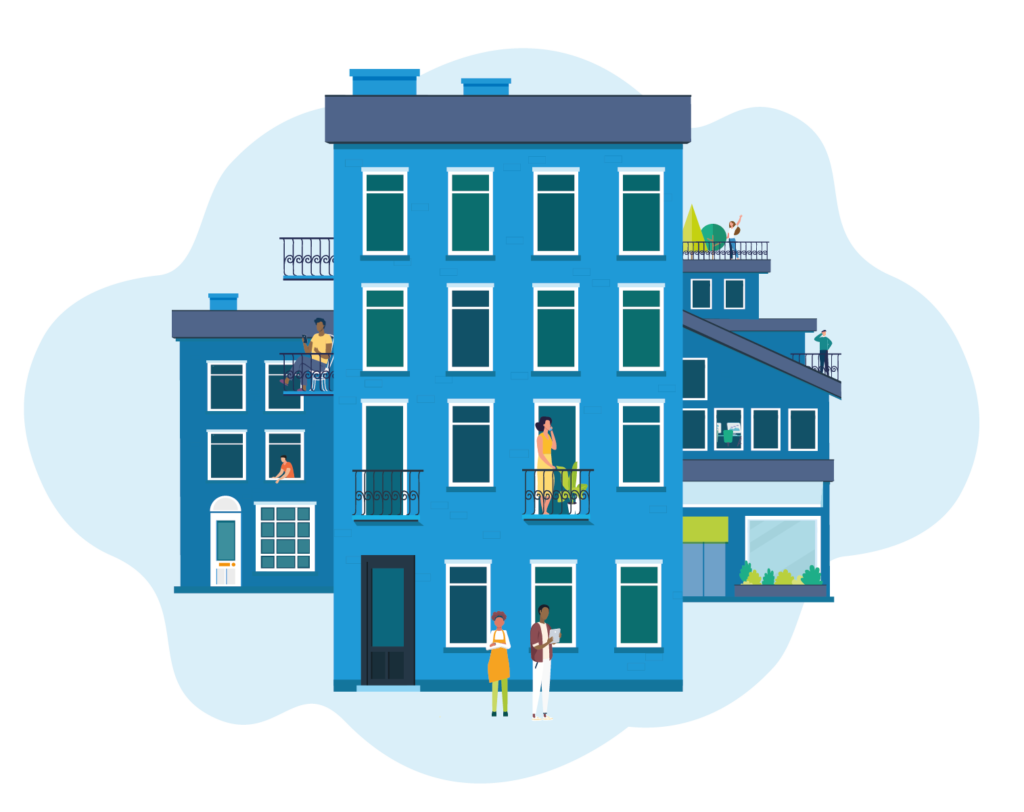Roles and responsibilities of condo boards vs. property managers: Key differences
The world of multifamily property management can be challenging without understanding the responsibilities of a condo board vs property manager. With over 70% of U.S. households living in communities governed by condo associations, their efficiency directly impacts resident satisfaction and property value.
In this guide, we explore the specific condo property management responsibilities of both condo boards and property managers. We’ll go over their key differences and show how their collaboration can create a thriving community.
What is a condo board?
A condo board is a group of owner-elected volunteers responsible for overseeing the financial and operational aspects of a condo corporation. These individuals represent the interests of all owners and residents. Their main function is to make decisions that affect the entire community, including managing common areas, establishing community rules, and overseeing financial matters.
Typically, a condo board consists of 3-5 members, although the size can vary depending on the community’s needs. Key roles within the board include the president, treasurer, and secretary, each with specific duties. The president oversees meetings and ensures policies are implemented, the treasurer manages financial matters, and the secretary keeps records and minutes of meetings.
What is a property manager?
A property manager is a professional hired by the condo board or property owner to manage the day-to-day operations of the property. Often part of a property management company, they provide expertise and support to ensure the property runs smoothly and efficiently. Their responsibilities include maintenance, tenant relations, and financial management.
Property managers act as a liaison between the condo board and residents, implementing board policies and addressing resident concerns. They bring a professional touch to property management, ensuring that operational aspects are handled expertly. Knowing what is a property management company and the role of a property manager can greatly benefit the efficiency and satisfaction of your condo community.
Roles and responsibilities
Knowing the roles and responsibilities of a condo board and property manager is vital. Both have different duties that add to the management of the property. Here is a breakdown of condo board vs. property manager roles and responsibilities:
Responsibilities of a condo board
The condo board is responsible for creating and enforcing community rules and regulations. They develop policies that promote a harmonious living environment for all residents. One of their main tasks is setting bylaws and ensuring compliance.
Financial management of a property is another critical responsibility. The board oversees the budget, manages reserve funds, and ensures that maintenance fees are allocated appropriately. They review and approve financial statements and make decisions on significant expenditures.
The board also handles major decision-making processes, such as approving significant repairs, upgrades, and renovations to the property. These decisions often require a majority vote among board members. The board is also responsible for hiring and managing external contractors for maintenance and repairs.
Responsibilities of a property manager
Property managers handle the day-to-day maintenance and operations of the property. This includes overseeing repairs, landscaping, and ensuring common areas are clean and functional. They arrange for regular maintenance and emergency repairs as needed.
They also manage tenant relations, address complaints, and ensure that residents follow community rules. Property managers are often the first point of contact for residents, facilitating communication and helping mediate disputes between residents.
Financial responsibilities of property managers include preparing budgets, collecting rent, paying bills, and keeping detailed financial records. They also assist with budgeting and financial planning, working closely with the condo board to ensure financial stability. Property managers ensure that all financial transactions are transparent and properly documented.
Key differences between condo boards and property managers
While both condo boards and property managers are integral to property management, their roles differ significantly. Understanding the differences between a condo board vs. property manager can help you understand who is responsible for which aspects. This will assist when it comes to allocating tasks, responsibilities, and timelines.
Condo boards focus on governance and high-level decision-making. They set policies and make decisions that impact the entire community, such as rent policies, maintenance policies, and noise policies. Property managers, on the other hand, handle the execution of these policies as well as the day-to-day operations of the property.
Condo boards are made up of volunteer residents whereas property managers are paid professionals. The condo board has the authority to hire and fire property managers. This makes them responsible for overseeing the property manager’s performance and ultimately makes them the main party in charge.
Property managers give professional advice and also implement the decisions made by the condo board. They do not make high-level policy decisions, but rather they ensure that the board’s decisions are properly implemented. Both a condo board vs. property manager are important for the smooth running of your property.
How condo boards and property managers work together
A condo board vs. property manager has different duties but must work together. Their collaboration is important for smooth property management. Both parties will have their functions and report back to the other party, often using property management software to streamline the process.
The condo board sets the overall direction and policies for the community, relying on the property manager to implement these policies. The property manager will provide updates to the board, including the status of various tasks and projects. They also bring any issues or concerns to the board’s attention, ensuring that issues are quickly addressed and the community’s needs are met.
How MRI Software can help condo boards and property managers
At MRI Software, we provide flexible software for property management designed to streamline the responsibilities of both condo boards and property managers. Our condo and HOA solutions automate essential tasks such as resident screening and digital rent payments, enhancing efficiency and reducing administrative burden. By supporting smooth collaboration between the condo association and residents, our software helps ensure your community runs smoothly and residents are satisfied.
Multifamily software used by the top ten NMHC managers
Take full control of the lead-to-lease process

Multifamily Tour Path Inspection Guide
Showing off your multifamily property is one of your first and best opportunities to “wow” prospective residents. As such, completing a tour path inspection is essential to a successful leasing experience. MRI Living is here to help you p…

